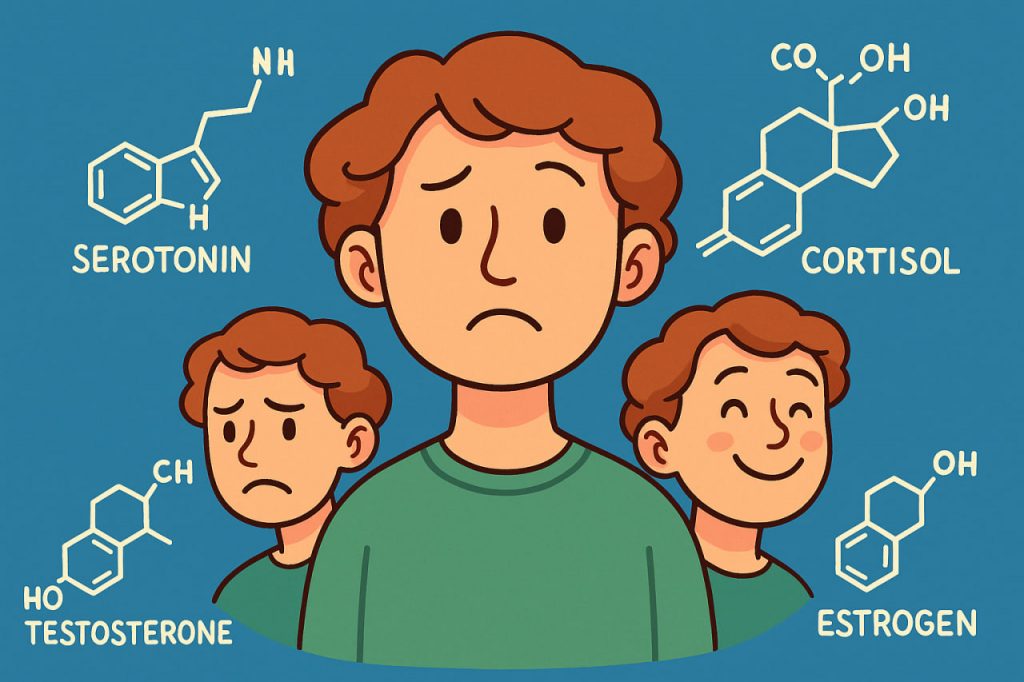Hormones are powerful chemical messengers that regulate many functions in the human body. One of their most noticeable effects is their influence on mood and emotions. Hormonal fluctuations can occur naturally during different life stages, cycles, or in response to stress, and they often shape how a person feels and behaves. Understanding the connection between hormones and mood helps explain why people sometimes experience sudden changes in emotions without any clear external cause.
How Hormones Influence the Brain
Hormones interact directly with the brain, especially with regions such as the hypothalamus and amygdala, which regulate emotions and stress responses. For example, changes in estrogen and progesterone levels influence serotonin and dopamine, two key neurotransmitters responsible for happiness, calmness, and motivation. When hormone levels shift, the balance of these brain chemicals also changes, leading to mood variations.
Hormonal Changes in Different Life Stages
Hormonal fluctuations occur throughout life. During puberty, surges of sex hormones often lead to emotional instability. Women may experience mood swings before menstruation (PMS), during pregnancy, and at menopause. Men also face hormonal shifts, especially in testosterone levels, which can affect confidence, energy, and irritability. These fluctuations are natural, but their intensity varies among individuals.
Stress and Hormonal Spikes
When the body encounters stress, it releases cortisol, the so-called “stress hormone.” While cortisol is vital for handling danger, chronically high levels can lead to anxiety, irritability, and even depression. Similarly, sudden drops in cortisol after prolonged stress can leave a person feeling exhausted and emotionally drained. Stress-related hormonal imbalance is one of the most common reasons for mood instability.
Mood Disorders and Hormonal Influence
Hormonal fluctuations can sometimes contribute to mood disorders. For example, postpartum depression is linked to sharp hormonal changes after childbirth. Thyroid hormone imbalances are also well-known for causing depression, anxiety, or mood swings. These cases highlight the importance of medical evaluation when mood disturbances become frequent or severe.
Healthy Lifestyle and Emotional Balance
Although hormonal fluctuations are natural, lifestyle choices strongly influence how they affect mood. Regular sleep, balanced nutrition, and physical activity help stabilize hormone levels. Stress management techniques such as meditation, breathing exercises, or spending time in nature can reduce the negative impact of sudden hormonal spikes. Self-medication is not advisable; consulting a healthcare professional is important when mood changes are persistent or disruptive.
Conclusion
Hormonal fluctuations are a natural part of life, and they play a significant role in shaping human emotions. While most people experience only mild mood changes, for some the effects can be intense. Recognizing the connection between hormones and mood helps people better understand their emotional states and seek healthier ways to cope with changes. A balanced lifestyle and professional advice are key to maintaining emotional stability during hormonal shifts.
Glossary
- Hormones – chemical messengers that regulate body functions and emotions.
- Neurotransmitters – brain chemicals such as serotonin and dopamine that affect mood.
- Cortisol – the stress hormone that influences energy, focus, and emotional responses.
- PMS (Premenstrual Syndrome) – mood and physical changes occurring before menstruation.
- Postpartum Depression – mood disorder after childbirth linked to hormonal changes.


